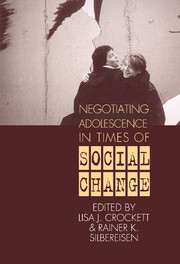Book contents
- Frontmatter
- Contents
- Contributors
- Preface
- 1 Social Change and Adolescent Development: Issues and Challenges
- Part I Models of Social Change Effects
- 2 Surmounting Life's Disadvantage
- 3 Marriage and the Baby Carriage: Historical Change and Intergenerational Continuity in Early Parenthood
- 4 Effects of Social Change on Individual Development: The Role of Social and Personal Factors and the Timing of Events
- Part II Social Change and Adolescent Transitions
- Part III Social Change and Adolescents' Social Contexts
- Part IV Implications of Social Change for Adolescent Health and Well-Being
- Part V Interventions: Promoting Healthy Development in Times of Social Change
- Endnotes
- Index
4 - Effects of Social Change on Individual Development: The Role of Social and Personal Factors and the Timing of Events
Published online by Cambridge University Press: 26 January 2010
- Frontmatter
- Contents
- Contributors
- Preface
- 1 Social Change and Adolescent Development: Issues and Challenges
- Part I Models of Social Change Effects
- 2 Surmounting Life's Disadvantage
- 3 Marriage and the Baby Carriage: Historical Change and Intergenerational Continuity in Early Parenthood
- 4 Effects of Social Change on Individual Development: The Role of Social and Personal Factors and the Timing of Events
- Part II Social Change and Adolescent Transitions
- Part III Social Change and Adolescents' Social Contexts
- Part IV Implications of Social Change for Adolescent Health and Well-Being
- Part V Interventions: Promoting Healthy Development in Times of Social Change
- Endnotes
- Index
Summary
Social change can be a gradual unfolding of different ways of life or can imply a sudden, fundamental transformation of economic, social, and political institutions, as was the case in Eastern Europe after the end of the Cold War. Individuals perceive, experience, and handle effects of social change on the basis of certain sociopsychological processes. This chapter focuses on how individuals deal with social change – how social change is perceived, experienced, and acted upon by the person and how these reactions affect human development.
Until recently, social change and individual development were studied separately in different disciplines. Attempting to relate these two complex topics of research may increase the risk of failing to deal successfully with either one. However, I believe that the study of individual development in a changing socioeconomic context will allow us to further our understanding of human development. This belief is based on the assumption that individual development is an active process taking place over the life course in multiple contexts. The active role of the individual is seen in the psychological processes of negotiating the self in relation to the environment, including goal setting, decision making, and behavior. The contextual view enlarges the individual-centered approach by specifying ecological conditions that affect individual development and by illuminating multidirectional processes in changing person—environment relations.
When dealing with the possible effects of social change on individual development, several issues have to be clarified:
Which aspects of social change have an impact on the individual person?
How is the individual person affected by such factors?
Why do some people gain from social change and others experience losses?
How does the outcome of social change affect further individual development?
- Type
- Chapter
- Information
- Negotiating Adolescence in Times of Social Change , pp. 58 - 68Publisher: Cambridge University PressPrint publication year: 1999
- 3
- Cited by

